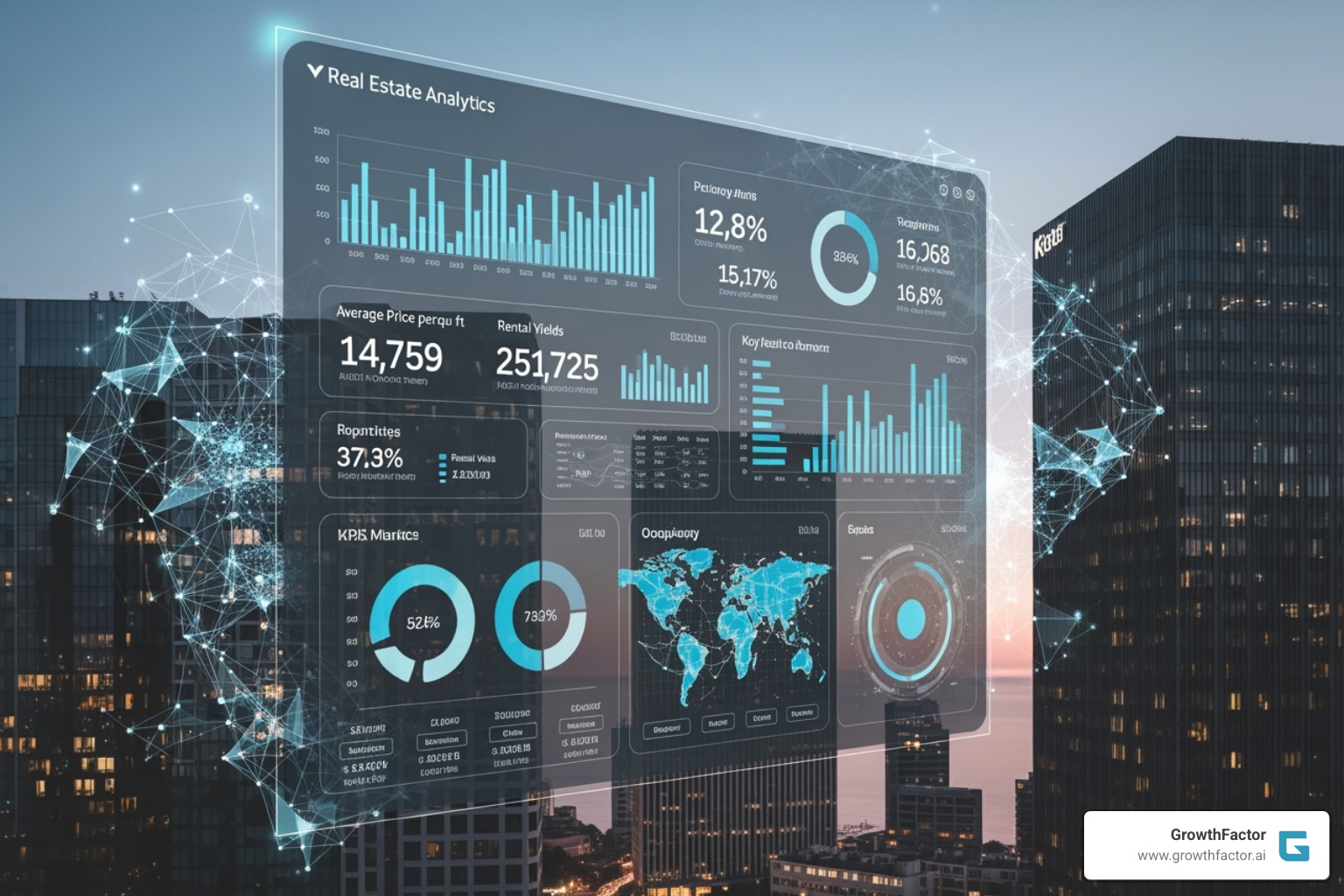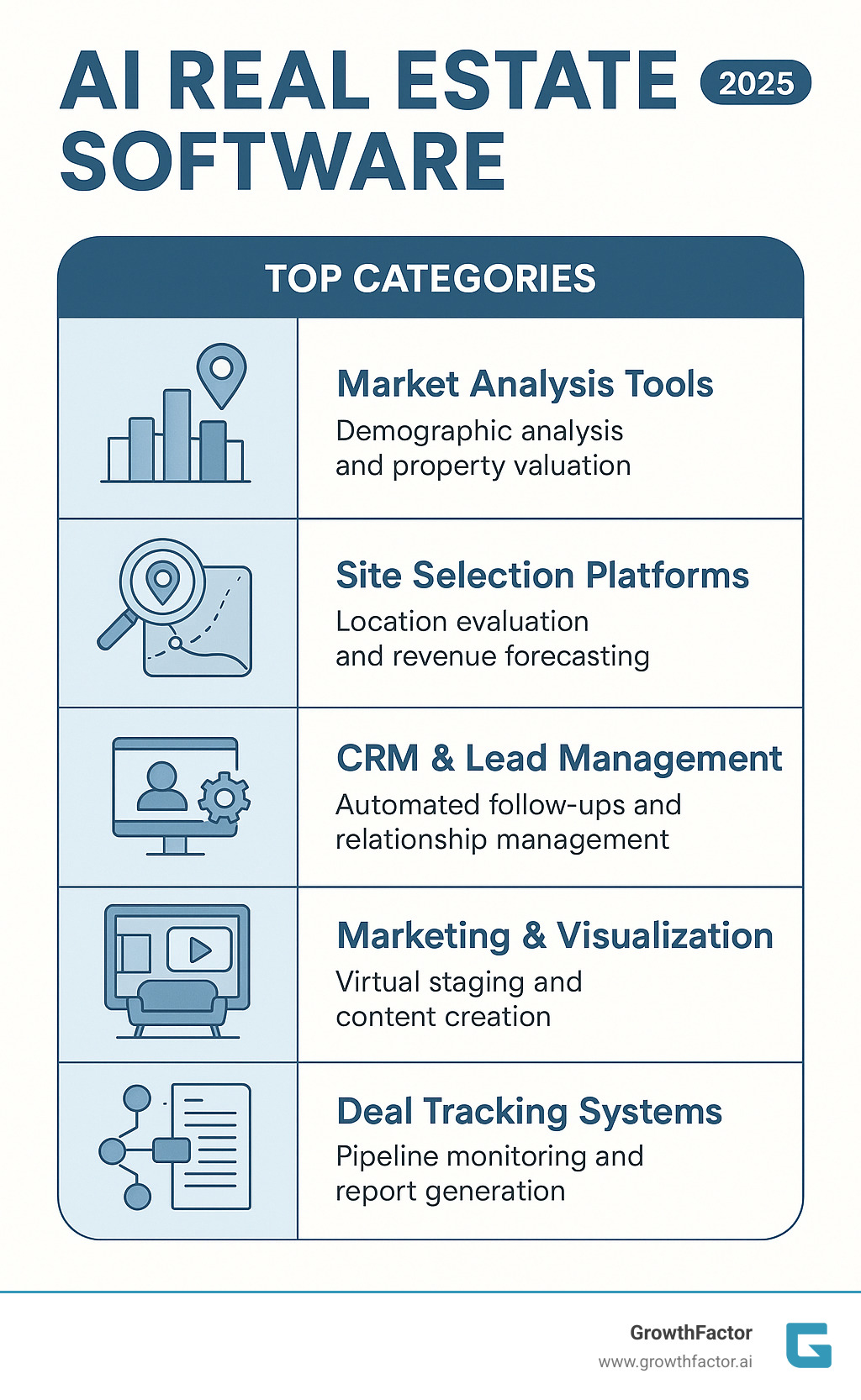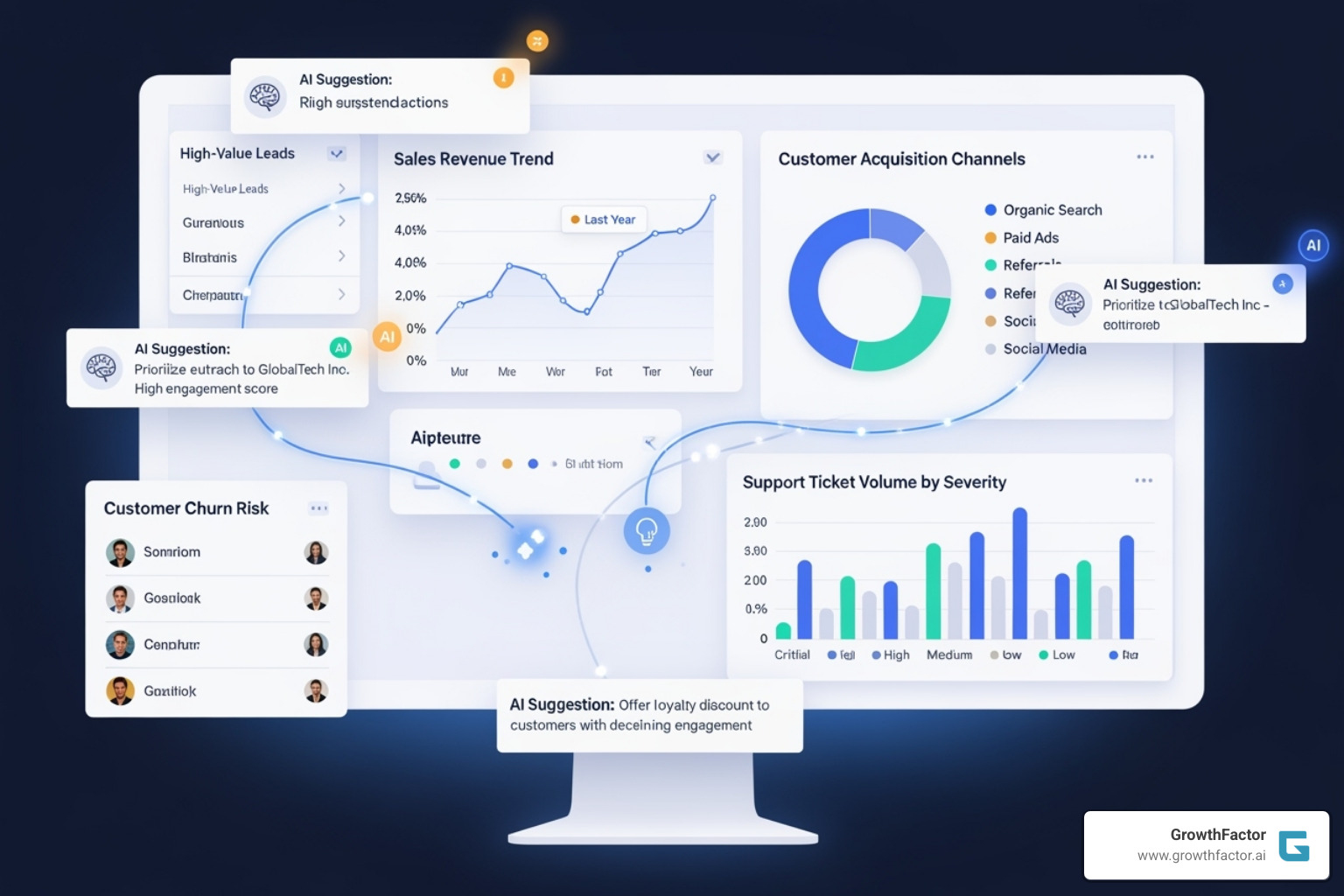Beyond the Hype: AI Real Estate Software Transforming Commercial Property
Written by: Clyde Christian Anderson
Why Commercial Real Estate Needs AI-Powered Solutions

AI real estate software is changing how commercial property professionals make critical decisions about site selection, market analysis, and deal management. These intelligent platforms automate time-consuming tasks, provide data-driven insights, and help teams evaluate more opportunities with greater accuracy.
Top Categories of AI Real Estate Software:
- Market Analysis Tools - Analyze demographics, predict property values, and identify market trends
- Site Selection Platforms - Evaluate locations using foot traffic, competitor data, and revenue forecasting
- CRM & Lead Management - Automate follow-ups, score leads, and manage client relationships
- Marketing & Visualization - Create virtual staging, property videos, and automated listing content
- Deal Tracking Systems - Monitor pipeline progress, generate reports, and streamline workflows
The numbers tell the story: companies using AI for site selection report 4-10x faster planning, 2.5x more design iterations, and 92% of customers closing deals faster. One development manager noted getting "to massing or yield within 10-15% margin of error in 30 minutes to an hour"—a process that previously took weeks.
The challenge for growing retailers is clear. Manual site selection using spreadsheets and gut instinct can't keep pace with expansion goals. Traditional consultants can be costly, while outdated software often requires months of training.
As Clyde Christian Anderson, Founder and CEO of GrowthFactor.ai, I've seen how ai real estate software opens up millions in revenue. During the Party City bankruptcy, our platform helped clients evaluate 800+ locations in 72 hours, securing $1.6M in cash flow. The future belongs to companies that combine cutting-edge AI with human expertise to make faster, smarter location decisions.

Essential ai real estate software terms:
AI for Market Analysis and Property Valuation
In commercial real estate, timely and accurate market analysis is paramount. Gone are the days of relying solely on intuition or outdated reports. AI real estate software is revolutionizing this domain by processing vast amounts of data, identifying subtle patterns, and delivering insights that empower better decision-making.
Advanced analytics and valuation models now help professionals understand local markets in granular detail. These platforms analyze millions of data points—from past sales to property specifics—to predict values with high accuracy. This capability is invaluable for investors and firms seeking to understand fair market value. Some tools specialize in commercial real estate, providing deep insights into property histories and market trends, while others focus on niche markets like short-term rentals, showing how AI can dissect specific sectors with precision.
Opening up Insights with Location Intelligence
When it comes to commercial real estate, especially retail, location is everything. But what makes a location perfect? It's about understanding the invisible forces at play—demographic data, foot traffic patterns, and the strategic placement of competitors. This is where location intelligence software powered by AI truly shines.
Our own platform at GrowthFactor leverages AI location intelligence to help clients define sites with rich data, ensuring they avoid risks early on. We integrate with leading data providers like ESRI for flood zone avoidance and access USA soil data (SSURGO) to understand topography and soil conditions. This allows our users to evaluate five times more sites efficiently, automating qualification processes that once took weeks.
AI-driven site planning can generate a multitude of design options, optimizing for the best building and site layout. This means we can assess a site's potential based on real-time data, not just assumptions. Imagine generating designs in seconds, testing zoning, unit mixes, and parking ratios to uncover the highest-and-best use of land. That's the power of Data-Driven Site Selection with AI.
For more on how AI can transform your decision-making, explore Location Intelligence Software.
Automating Valuation and Underwriting
The traditional processes of property valuation and underwriting are often manual and time-consuming. With ai real estate software, we're seeing a fundamental shift towards automation and improved accuracy. Automated Valuation Models (AVMs), for example, use AI to predict property values by analyzing extensive datasets, including historical sales, property characteristics, and market trends.
Beyond valuation, AI is making inroads into risk assessment and financial modeling during underwriting. Tools can analyze loan applications, borrower creditworthiness, and property-specific risks at lightning speed, leading to faster approvals and a more consistent process. Our focus on AI real estate underwriting ensures that our clients can assess deals with unprecedented speed and accuracy.
Furthermore, AI is proving invaluable in document analysis. AI-Powered Lease Abstraction tools can automatically extract key data points from lease agreements, converting unstructured text into actionable information. This saves countless hours and minimizes the risk of missing critical details that could impact a deal's profitability.
AI for Lead Generation and Client Management
Finding and nurturing the right clients is critical in commercial real estate. The good news? AI real estate software is changing how we connect with prospects and manage relationships, handling repetitive tasks so you can focus on what humans do best: building trust and closing deals.
AI can work while you sleep, identifying potential clients, scoring leads based on their likelihood to convert, and sending personalized follow-ups. This isn't about replacing the human touch—it's about ensuring you spend your time on the conversations that matter most.
Predictive lead scoring is where AI really shines. Instead of treating all leads equally, these systems analyze behavior and historical data to highlight which prospects deserve immediate attention. Meanwhile, automated follow-ups ensure promising leads don't slip through the cracks. The beauty of modern Commercial Real Estate Tech is how it handles the entire journey, from the first website visit to the final handshake.
The Power of AI-Improved CRMs
Your CRM is no longer a digital Rolodex; it's a strategic partner. AI-improved CRMs don't just store contact information—they actively help you understand your relationships and predict what your clients need next.

Imagine your CRM suggesting a call to a client whose lease is renewing or flagging a prospect who has been unusually active on your website. That's relationship intelligence at work. These systems analyze every interaction—emails, calls, property views—to give you a complete picture of each relationship.
Automated data entry captures key details from calls and emails, while sales forecasting helps predict which deals are likely to close and when. For busy professionals juggling dozens of relationships, this level of insight is invaluable. Asset managers particularly benefit, as the CRM can help predict maintenance needs, flag lease renewals, and identify expansion opportunities. Learn more about how AI for Asset Managers is changing the game.
AI Chatbots for Engagement and Qualification
Ever lost a deal because you couldn't respond fast enough? AI chatbots prevent that by providing 24/7 customer service, engaging prospects the moment they show interest. Powered by Natural Language Processing (NLP), modern chatbots handle complex conversations, qualify leads by asking targeted questions, and schedule appointments directly into your calendar. They learn from each interaction, becoming more effective over time.
This automated lead qualification and appointment scheduling means your team spends less time on administrative tasks and more time with high-quality, pre-vetted prospects. By providing instant responses, you capture interest when it's highest, ensuring no opportunity slips away. It's like having a dedicated salesperson working around the clock.
AI for Marketing and Property Visualization
Imagine you have a great commercial property, but it's sitting empty. Potential tenants struggle to see its true potential. This is where ai real estate software steps in, changing how we market and showcase properties.
Generative AI technology can create stunning visuals, craft compelling marketing content, and even produce videos from simple inputs. What once required expensive photographers, staging companies, and copywriters can now be accomplished in minutes. This isn't just about aesthetics; it's about helping clients connect with spaces and make faster decisions.
The impact on AI for Property Development has been particularly exciting. Developers can now show investors and tenants exactly what a space will look like before construction begins, dramatically improving buy-in and reducing project timelines.
Changing Spaces with Virtual Staging and Redecorating
An empty commercial space can be hard to envision. Virtual staging and redecorating powered by AI solves this by digitally furnishing, styling, and even renovating spaces to create inviting environments that help prospects see the potential.

Modern AI staging tools can transform empty offices into busy work environments complete with interior design elements, 3D floor plans, and virtual tours. They can add furniture, adjust lighting, and even show renovation possibilities.
The cost savings are impressive. Traditional staging for a large commercial space can be expensive and logistically complex. Virtual staging accomplishes the same goal for a fraction of the cost and allows for multiple design variations to appeal to different tenants.
The results speak for themselves. Properties with virtual staging typically receive more inquiries, spend less time on the market, and command higher rents because prospects can immediately see the space's potential.
Automating Marketing Content Creation
Creating fresh, engaging marketing content used to consume hours. Between writing listing descriptions, crafting social media posts, and developing email campaigns, there was little time left for deal-making. Thankfully, ai real estate software has revolutionized content creation.
Modern AI tools can analyze a property's key features and automatically generate compelling descriptions that highlight its most important selling points. They ensure SEO optimization by incorporating relevant keywords, helping your listings get found online. The same technology can adapt this content for different platforms, from professional LinkedIn posts to eye-catching Instagram content.
Brand consistency becomes effortless when AI handles content creation, as the software learns your company's voice and style. This automation extends to video creation, changing static photos into dynamic video tours. This frees up your valuable time for what really matters: building relationships with clients, negotiating deals, and growing your business.
How to Evaluate AI Real Estate Software for Your Business
Choosing the right ai real estate software is like selecting a new team member—you want a partner who makes your life easier. The key is having a clear methodology to separate the game-changers from the shiny distractions.
Start by assessing your biggest pain points. Are you drowning in manual site evaluations? Struggling with lead follow-up? The best ai real estate software should directly address these challenges.
Next, consider the human factor. Look for platforms that offer solid onboarding and training resources to improve your team's expertise, not create new headaches. Integration capabilities are also critical. You need a system that connects seamlessly with your existing CRM or Real Estate Deal Tracking Software to create a unified workflow.
At GrowthFactor, we've built our platform with this philosophy in mind. Our AI Agent Waldo doesn't just analyze sites; it integrates into your existing processes, making your team more efficient without a steep learning curve.
Key Features of Top-Tier AI Real Estate Software
When evaluating ai real estate software, certain features separate the winners from the rest. These are the foundation of tools that deliver real results.
Scalability is your first checkpoint. The platform should handle increased volume as you grow. Customization follows closely—your tools should adapt to your unique workflows. Reporting and analytics are crucial; the best platforms translate data into actionable insights. Finally, mobile access is a necessity, allowing your team to access critical information from anywhere.
Don't overlook customer support and training resources. Responsive support can mean the difference between successful adoption and expensive shelf-ware.
| Feature Category | Market Analysis Tools | CRM & Lead Management Tools | Marketing & Visualization Tools |
|---|---|---|---|
| Scalability | High (big data processing) | High (user/data volume) | Medium (asset storage) |
| Customization | Report views, data filters | Workflows, communication | Templates, branding |
| Reporting & Analytics | Market trends, property values | Lead scoring, sales forecast | Campaign performance, engagement |
| Mobile Access | Often limited to web portals | High (app-based) | Medium (app/web) |
| Customer Support | Data interpretation, setup | Integration, workflow help | Creative guidance, tech support |
Our AI Agent Waldo exemplifies these principles, combining powerful site evaluation with intuitive reporting to help you make better decisions faster.
Assessing Costs, ROI, and Data Security
Pricing for ai real estate software varies, from free tools to enterprise solutions. We offer flexible plans like Core ($500), Growth ($1,500), and Enterprise to fit different needs. The key metric, however, is ROI. The value comes from significant time savings—our clients evaluate five times more sites in the same timeframe, creating a clear competitive advantage. This leads to increased deal flow and reduced operational costs, as AI handles repetitive analysis, freeing your team to focus on high-value activities.
Now, let's address data security. Your ai real estate software will handle sensitive information, so robust security is non-negotiable. Look for platforms with strong data encryption and clear compliance with regulations like GDPR and CCPA.
The Goldman Sachs prediction on AI's economic impact reminds us that this technology will reshape industries. The question isn't whether AI will impact your business, but whether you'll lead the change or scramble to catch up. Choose platforms that are transparent about their security practices and how they protect your data.
Frequently Asked Questions about AI in Real Estate
As ai real estate software becomes more mainstream, many professionals wonder how this technology will fit into their world. Let's tackle the most common questions.
Can AI tools replace the human element in real estate?
No, AI is a partner, not a replacement. AI real estate software excels at data analysis, pattern recognition, and automating tedious tasks. However, it cannot replicate the human touch needed for negotiation, relationship-building, or understanding a client's emotional connection to a deal.
Think of AI as a powerful research assistant that handles the quantitative work, freeing you to focus on high-value, interpersonal tasks. The best results come from combining AI's data-driven insights with your market intuition and creative problem-solving skills. AI manages the repetitive work, while you manage the relationships that close deals.
What is the learning curve for adopting AI technology?
The great news is that most ai real estate software is designed for busy professionals, not tech experts. You don't need to be a programmer to benefit from these tools. Most platforms feature intuitive interfaces that feel familiar.
The key is starting small. Most providers offer comprehensive onboarding, tutorials, and customer service teams who understand real estate. At GrowthFactor, we've built our platform for powerful AI capabilities without the technical headaches.
The learning curve typically involves interpreting AI-generated insights rather than mastering complex technical skills. Once you see the value, adoption accelerates naturally. Most users are comfortable with basic functions within weeks.
How reliable are AI-driven market analysis and trend predictions?
AI-driven market analysis has become remarkably accurate as algorithms and datasets have improved. These systems process massive amounts of information—from demographic shifts to historical sales—to identify patterns impossible for humans to spot manually.
However, it's important to be realistic. Predictions are based on historical data and probability, making them excellent for identifying trends under normal conditions. They may not account for unexpected events like global pandemics or sudden policy changes.
The smartest approach is using AI-driven insights as a powerful decision-support tool that improves your expertise. Your understanding of local market nuances provides crucial context that AI can't replicate. When you combine AI's analytical power with your real-world experience, you get insights that are both data-driven and practically grounded.
Conclusion: The Future is a Partnership Between Agents and AI
The commercial real estate world is changing, and ai real estate software is leading the charge. What once seemed like science fiction is now helping professionals close deals faster, evaluate more properties, and make smarter decisions. Today's AI tools are sophisticated partners that handle complex analysis, predict trends, and generate marketing content.

What's exciting is that AI isn't replacing professionals; it's making them superhuman. While AI crunches numbers and generates reports, you're free to focus on what humans do best: building relationships and negotiating complex deals. It's like having a tireless research assistant working 24/7, amplifying your capabilities.
At GrowthFactor, we've seen this partnership in action. Our clients are evaluating five times more sites than they could manually, with greater accuracy. When Party City filed for bankruptcy, we helped clients evaluate over 800 locations in just 72 hours—a task that would have taken months using traditional methods. That's the power of combining human expertise with intelligent technology.
The competitive advantage is real. Companies embracing ai real estate software are closing deals faster, identifying better opportunities, and scaling their operations in ways that seemed impossible just a few years ago. Those still relying on spreadsheets and gut instinct risk being left behind.
Looking ahead, AI will become even more sophisticated, but one thing will never change: the need for human judgment, creativity, and relationship-building skills. The future isn't about choosing between humans and AI—it's about combining both to achieve extraordinary results. To see how this partnership can revolutionize your retail site selection, explore Waldo - The AI Agent for Retail Site Selection and Report Building. Ready to find what AI-Powered Real Estate can do for your business? The future is here.
Citations
The human algorithm
Request Your demo
Schedule meeting
Or submit your information below and we'll be in touch to schedule.



